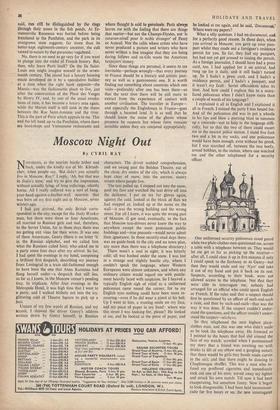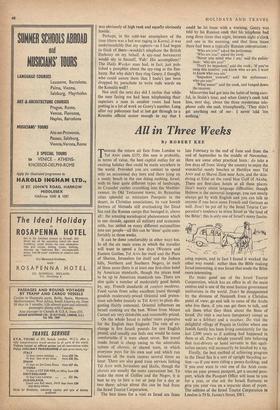Moscow Night Out
By CYRIL RAY
NOWADAYS, as the tourists bustle hither and back, under the kindly eye of Mr. Khrush- chev, when people say, 'But didn't you actually live in Moscow, Ray?' I reply, `Ah, but that was in Stalin's time,' and try to give the impression, without actually lying, of long sufferings, silently borne. All I really suffered was a sort of bang- your-head-against-a-feather-wall neurosis that was born on my first night out in Moscow, seven winters ago.
I had just arrived, the only British corre- spondent in the city, except for the Daily Worker man, but there were three or four Americans, all married to Russian girls and tied, therefore, to the Soviet Union, for in those days there was no getting exit visas for their wives. It was one of these Americans, Genry (there is no letter 'h' in the Russian alphabet, and we called him what the Russians called him), who asked me to a party some four days after my arrival. So far, I had spent the evenings in my hotel, composing a brilliant first despatch, describing my journey from Leningrad in a train old-fashioned enough to have been the one that Anna Karenina had flung herself under—a despatch that still lies, as far as I know, in the Moscow censor's pending tray. In triplicate. After four evenings in the Metropole Hotel, it was high time that I went to a party, and I walked blithely out into the icy, glittering cold of Theatre Square to pick up a taxi.
Unsure of my few words of Russian, and my accent, I showed the driver Genry's address written down by Genry himself, in Russian characters. The driver nodded comprehension, and we swung past the Bolshoi Theatre, out of the clean, dry centre of the city, which is always kept clear of snow, into the narrow, snowy streets where people live.
The taxi pulled up. I stepped out into the snow, paid my fare and watched the taxi drive off into the darkness. I put on my fur gloves again, against the cold; looked at the block of flats we had stopped at; looked up at the name on the wall—it was the wrong building and the wrong street: For all I knew, it was quite the wrong part of Moscow. (I got used, eventually, to the fact that Moscow taxi-drivers never knew the way to anywhere except the most prominent public buildings and—true peasants—would never admit their ignorance. In those security-mad days there was no guide-book to the city and no town plan, any more than there was a telephone directory.) There wasn't a soul in sight; it was bitterly cold; all was hushed under the snow. I was lost in a strange and slightly hostile city, where I couldn't speak the language, where Western Europeans were almost unknown, and where any ordinary citizen would regard me with puzzle- ment heavily laced with suspicion. So I heaved a typically English 'sigh of relief as a uniformed policeman came round the corner, for to my English eyes nothing could have been more re- assuring—even if he did wear a pistol at his belt. Up I went to him, a trusting smile on my face, and my piece of paper in my hand : where was this street I was looking for, please? He looked at me, and he looked at the piece of paper, and
he looked at me again, and he said, `Documente Where were my papers?
What a silly question. I had no documenti, and for a perfectly good reason. In those days, when you arrived in Moscow, you gave up your pass- port whilst they made out a foreigner's residence permit for you. So far, they had my passport, but had not yet got around to issuing the permit. As a foreign journalist, I should have had a press card, too. I had applied for it on arrival, had rung up for it daily, and it still hadn't turned up. So I hadn't a press card, and I hadn't a reSidence permit, and I hadn't a passport, and it wasn't my fault : Soviet officialdom takes its time. And how could I explain this to a stony- faced policeman when I didn't know more than a couple of words of his language?
I explained it all in English and I explained it all in French. I mimed the party I was bound for. And all the policeman did was to put a whistle to his lips and blow a -piercing blast to summon up a comrade--not to help in the language diffi- culty, but so that the two of them could escort me to the nearest police station. I stand five foot two and a bit in my socks, and one policeman would have been enough, even without his pistol, but I was marched off, between the two beefy, armed bobbies, to the station, where one watched me and the other telephoned for a security officer.
One uniformed security policeman stood guard while two plain-clothes men questioned me, across a table with a telephone between us. They would let me get as far as picking up the receiver— after all, I could clear it up in five minutes if only I could speak to the Embassy or to Genry—but then they would smile and say Wyet' and take it out of my hand and put it back on its rest. Suspects, according to their book, were not allowed access to the telephone. Not that they were able to interrogate me; nobody had arranged for an official who could speak English or French. If the rules said that a suspect should first be questioned by an officer of such-and-such a rank, and then by such-and-such—that was the way it was done. If the suspect couldn't under- stand the questions, and the officer couldn't under- stand the suspect—nitchevo.
So they telephoned the next highest plain- clothes man, and this was one who didn't smile as he took the telephone away. He frowned as I pointed to the hours that had slid around the face of my watch; scowled when I pantomimed my story that a friend was awaiting me with drinks (a lift of my elbow and a gurgling noise); that there would be girls (my hands made curves in the air); and that there might be dancing (a Chaplinesque shuffle). This was a man who re- fused my proffered cigarettes and immediately took out one of his own; waved away my lighter and struck his own match. Till now it had been exasperating, but somehow funny. Now it began to look disagreeable. I had been held incommuni- cado for five hours or so; the new interrogator
was obviously of high rank and equally obviously hostile.
Perhaps, in the cold-war atmosphere of the time (there was a hot war raging in Korea), it was understandable that my captors—as I had begun to think of them—wouldn't telephone the 'British Embassy on my behalf. A spy-mad bureaucrat would say to himself, 'Pah! His accomplices !' The Daily Worker man had, in fact, just pub- lished a pamphlet about the spy-ring at the Em- bassy. But why didn't they ring Genry, I thought, who could assure them that I hadn't just been dropped by parachute to write rude words on the Kremlin wall?
Not until the next day did I realise that while the men facing me had been telephoning their superiors a man in another room had been putting in a lot of work on Genry's number. Long after my policemen had at last got through to a Kremlin official senior enough to say that I could be let loose with a warning, Genry was told by his Russian cook that his telephone had rung three times that night, between eight o'clock and one in the morning, and that three times
there had been a typically Russian conversation : 'Who are you?' asked the policeman. 'Who are you?' asked the cook.
'Never you mind who I am,' said the pollee- man : 'who are you?' 'Don't be impudent,' said the cook: 'if you've rung this number, you know who we are. I want to know who you are.' 'Impudent yourself,' said the policeman : who are you?'
'What sauce!' said the cook, and banged down the receiver.
Muscovites had got into the habit of being care- ful, in Stalin's time, and when Genry's cook told him, next day, about the three mysterious tele- phone calls she said, triumphantly, 'They didn't
get anything out of me: I never told 'em nothing.'



































 Previous page
Previous page